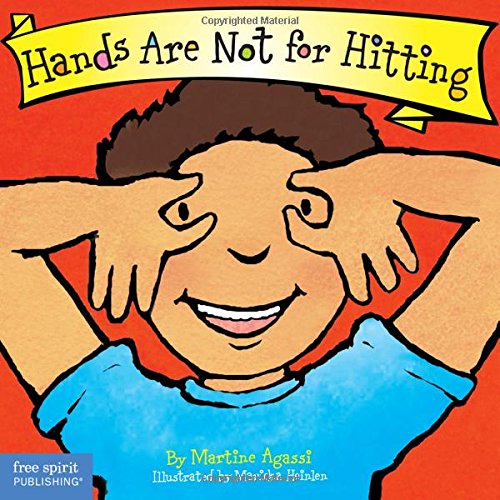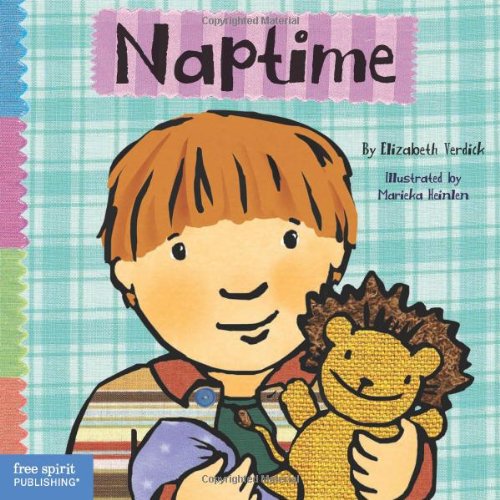Tantrums
In these early years, your little ones are growing and changing rapidly. They’re learning so many new things about the world and about themselves. One thing they’ve not yet learned to do is self-regulate. This is also a time when language is still emerging, leaving them with limited options for self-expression. And there you go, the perfect recipe for tantrums!
But have no fear, great books are here!
I hope you love the books I recommend! Please note that the links below are affiliate links. As an Amazon Associate I earn from qualifying purchases.
Author, Elizabeth Verdick, has a fantastic series of books that take on many challenging behaviors. These books are simple, to-the-point, and communicate clear, strong messages. They have tips and strategies for parents too! I ABSOLUTELY love that the illustrations in these books feature children of all different ethnic backgrounds. They’re available in English/Spanish editions and you can choose board books or paperbacks.
Calm Down Time models great strategies for calming down, including asking for a hug, deep breathing and finding a quiet space.
Voices Are Not For Yelling, Teeth Are Not For Biting, Hands Are Not For Hitting, Words Are Not For Hurting and Feet Are Not For Kicking can be used as needed, depending on the behaviors you’re dealing with. They model appropriate and positive ways to use our bodies.
Bye Bye Time, Clean Up Time, Sharing Time, Meal Time, Listening Time, are helpful because they address the specific moments that are common tantrum triggers. Is your child melting down at clean up time or when it’s time to say goodbye? these are for you!
Breathe With Me & Isle of You are both beautiful books that offer strategies for calming down and relieving stress. Try reading these after a particularly tough day or right after a meltdown. They’ll leave you and your little one feeling calm.
Allie All Along - I LOVE this book! When Allie gets angry she turns into the red monster. As she calms down she slowly turns from red, to green, to blue, then yellow and finally back to herself. This book has been great for my family. It’s given us a way to talk about and measure how my daughter is feeling when she’s having a tantrum. I can ask her “what color are you right now?” and we can talk about ideas to help her get to the next (calmer) color.
The Color Monster - Color Monster wakes up one day with his emotions all mixed up. His friend helps him identify and sort out all of his feelings. This a good book for kids 3+ because it helps them learn and label their feelings.
No More Tantrums and I Can Handle It offer positive affirmations and practical strategies for staying calm and calming down.
Move Your Mood is another great book with strategies to de-stress and get energy out. By the time your child is done moving their body in all the different ways listed in the book, they might not remember what was so upsetting in the first place.
Fergal and the Bad Temper - is a fantastic story about a dinosaur who has trouble keeping his cool. His fiery temper gets in the way of everything, ruining everything from soccer class to enjoying a snack with his friends. With a little help from his mom, Fergal learns strategies for calming down, and shares them with his friends. This one is simple enough to read with a two year old, but would also be great for a preschooler or kindergartener.
Quick Tips:
Preview the books before reading them, this will help you gauge whether they’re right for your child’s age and attention span.
Find a cozy place to read, such as the couch, in a rocking chair, inside a home-made pillow fort. Children who are de-escalating after a tantrum will find comfort in soft, inviting spaces.
As you read, take your time, let your child take in the words and pictures, answer questions that come up. If your child is sharing his/her thoughts and comments, stop reading and listen.
While there is no guaranteed way to stop a tantrum, it often helps to say “do you need a hug?” This may sound cheesy, but often tantrums happen when children feel out of control. For many children, a hug brings comfort and a feeling of safety, which can sometimes stop the tantrum in its tracks. If your child says no, respect their wishes, let them know you’re there to help when they’re ready.
Humor helps! When students in my class are escalating, I turn things around with a silly question, like “what’s wrong? did a dinosaur eat your lunch?” or “did a zebra take your toy?”
Sometimes a tantrum simply has to run its course. If you’ve tried helping your child and they’re not in danger of hurting themselves or others, sometimes giving them the space they need to cry or scream is all you can offer.
Remember that tantrums are going to happen sometimes, no matter how hard we try to prevent them. The important thing is to let your child know that you understand they’re upset and that you’re there to help when they’re ready.
As always, discuss any concerns about your child with your pediatrician, teacher and/or caregiver.
Need more help? You can find more resources at the National Institute of Mental Health and the CDC.
Did these books help? Do you have books that worked better for you and your family? Need more suggestions? Leave a comment below or send us an e-mail at bigbooksforlittlehands@gmail.com


































